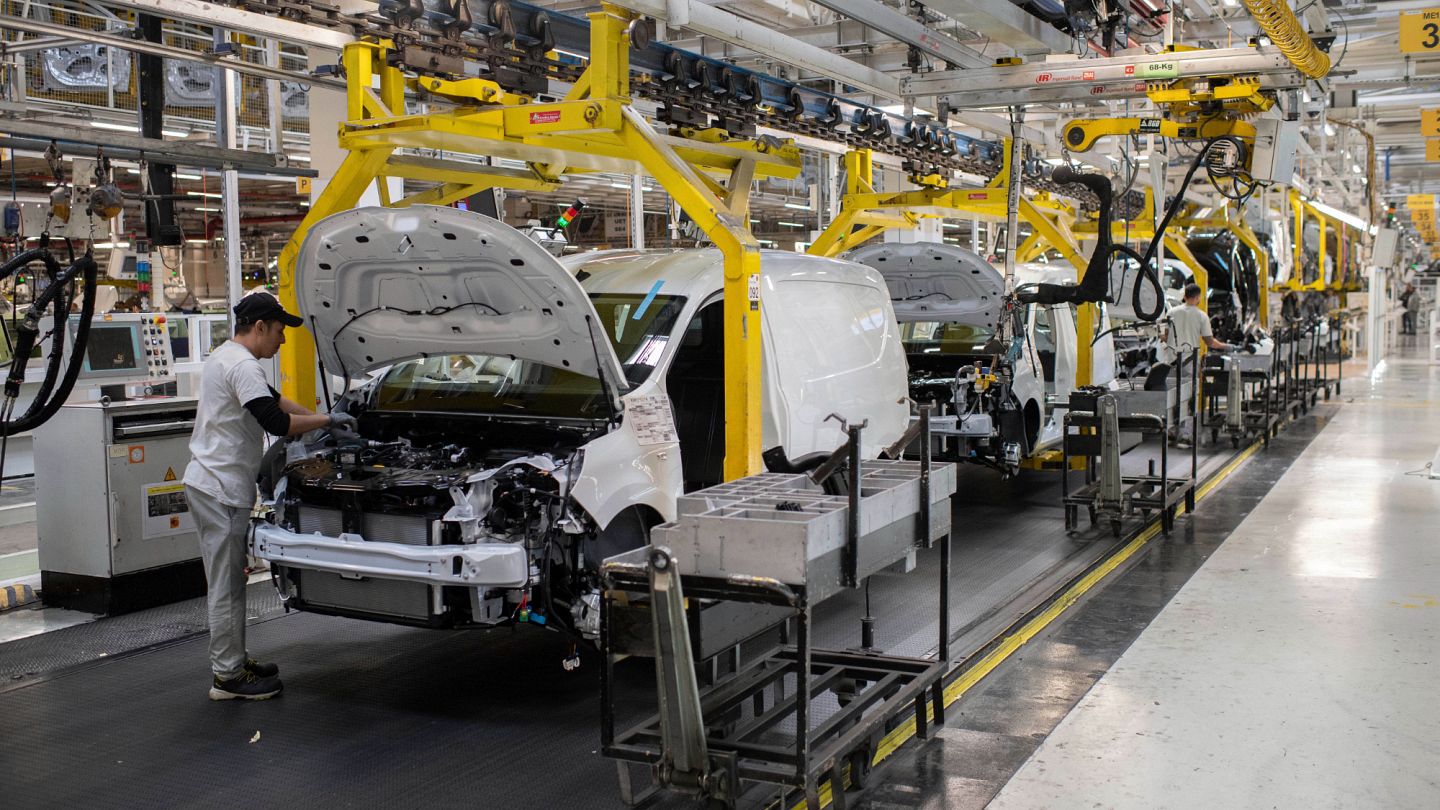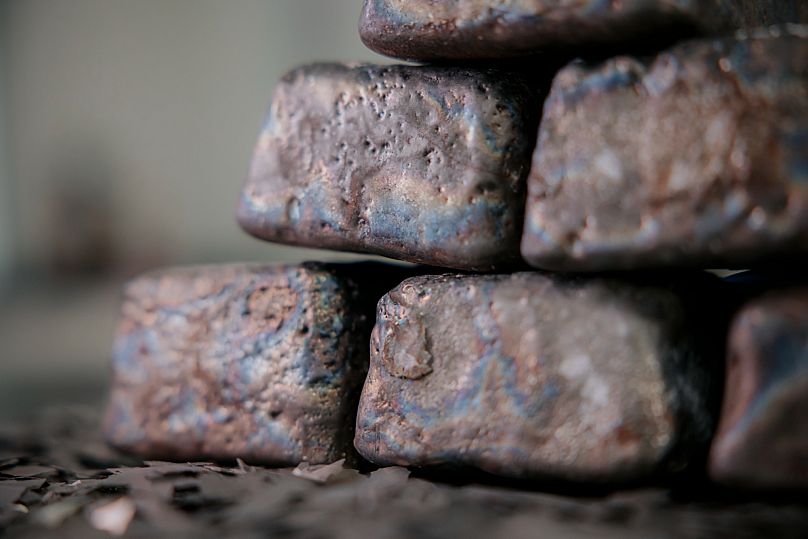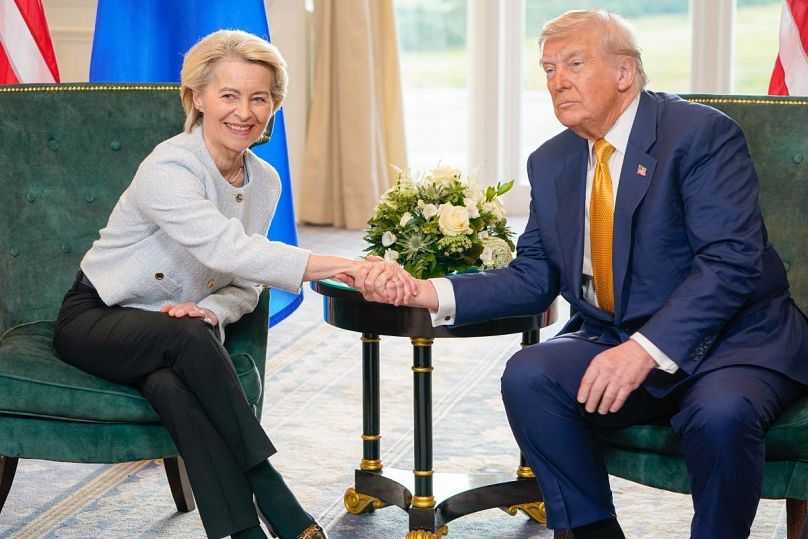
Europe’s fragility on defence is giving leeway to Washington, which has been pressuring the EU to ease environmental laws and trying to create friction between the bloc and China, as the ousting of Nexperia’s CEO revealed.
The European Union is stuck between US economic coercion and Russian military threat, a predicament that makes the 27-member bloc vulnerable and gives in to Washington’s demands.
Seizing this vulnerability, the US is taking steps to create friction between the EU and China, a key trading partner for the success of the bloc’s climate pledges of reducing emissions to net-zero by 2050. To attain such a goal, the European industry is radically transforming itself and relying heavily on essential materials coming from Beijing.
The chipmaker company Nexperia is the latest example of Washington’s economic coercion towards the EU, as the Trump administration pressured the Dutch government to dismiss Nexperia’s CEO Zhang Xuezheng or else the company would be kept on the US’ export control list, according to media reports, a demand that was processed by the Netherlands.
Nexperia is a subsidiary of China’s Wingtech with several European companies, like VW, BMW and Stellantis, dependent on their components.
While Nexperia has not stopped production, the standoff is delaying global output and supply chains are severely disrupted — a reality that could further strain the industry’s ability to deliver the EU’s binding goal of having 100% electric vehicles by 2035.
The European Automobile Manufacturers’ Association (ACEA) director general Sigrid de Vries said the situation was “alarming” and called for “quick and pragmatic” responses from all countries affected.
“Automakers have taken steps over the last years to diversify supply chains but risk cannot be mitigated down to zero. This is a cross-industry issue affecting a large number of suppliers and virtually all of our members,” said the automotive lobby’s chief.
China’s restriction on rare-earth metals
The Sino-Dutch diplomatic incident could bite the EU and its ability to deliver on the bloc’s digital and climate goals.
China’s latest restriction of exports of rare earth metals — triggered by the US — could prove to be crucial for further development of clean technologies like wind turbines, solar PVs, or EV motors. European manufacturers will be among the first to feel the heat, potentially facing delays in production and ultimately raising costs.
Under the new restrictions announced on 9 October, companies seeking Chinese critical raw materials for manufacturing clean technologies — such as holmium, thulium, and europium — will need to go through a burdensome process.
The EU’s downstream battery production accounts for only 7% of the global market share, according to ACEA, while China leads with battery production accounting for 83% of the world’s production.
Moreover, 92% of raw materials like graphite, used in battery anodes, are highly concentrated in China, with Beijing controlling vast reserves of extraction and refining of this key resource.

A spokesperson at China Chamber of Commerce to the EU (CCCEU) told Euronews that both Beijing and Brussels are committed to multilateralism and “shared interests in the green transition,” adding the EU should not be overly reliant on a single partner to avoid exposure to economic and political leverage.
“Despite facing US economic and technological pressure, China has a clear incentive to work with Europe to maintain global trade stability and foster mutual growth,” the CCCEU’s spokesperson added.
Concerns over rare earths are being “largely overstated”, the Chinese business representation in Brussels said, adding that China’s policies are “not targeted at European companies” and that fast-track channels to facilitate rare earth licensing have been agreed between the EU and China.
Tim Rühlig, senior analyst at the EU Institute for Security Studies (ISS), questioned the stability of the situation, noting that European companies will get licenses for a few months, but they will need to reapply, a process that will take time and money.
“The major concern here is that this is also a way to incentivize the purchase of clean technologies from China in detriment of domestic production,” Rühlig told Euronews, referring to the “indispensability of Chinese clean tech”.
Washington’s pressure
Washington is running the show with trade tariffs, threats and demands, such as the call for the EU to wean off Russian energy or dilute landmark sustainability bills, like the EU’s carbon tax, corporate due diligence and deforestation laws.
Seeing the EU desperate to increase defence capabilities in the face of a threatening Russia, the Trump administration is not going easy on Europe, and EU leaders keep giving in over fears of being let down in the event of military action from Russia against the 27-member bloc.
It is a fear that most member states perceive as real, following the series of provocative drone incursions, presumably from Moscow, in European airspace over the past months.

The EU-US trade deal struck in the summer also revealed the EU’s fragilities as the bloc came out as the losing partner, critics said, pointing at the unnecessary quantities of expensive energy the EU must buy, amounting to $250bn (€214.3bn) per year until 2028, to the 50% tariffs applied on steel, aluminum and copper, and 100% tariffs on pharmaceuticals, among others.
“The EU-US trade deal unfortunately confirms the president’s fallacious narrative that global trade has been unbalanced and that the United States is suffering from this unfairness,” wrote former Swedish Commissioner Cecilia Malmström, currently a senior researcher at the Peterson Institute for International Economics (PIIE) think tank.
“It also cements a new trading order where tariffs are accepted as a geopolitical cudgel,” Malmström added.
Trump’s frequent threats linked to Europe’s lack of investment in NATO are also giving jitters to European leaders, with Spain being Trump’s latest target, having implied last week that the southern country should be kicked out of NATO.
Will China listen to the EU?
The EU is having talks with China, and a meeting between European Commissioner for Trade Maroš Šefčovič and his Chinese counterpart Wang Wentao is expected on Tuesday. But questions on whether Beijing will go easy on the EU remain.
Fredrik Erixon, the founding director of the think tank European Centre for International Political Economy (ECIPE), said Europe has been in a position of economic weakness for a long time and getting out of that downtrend spiral “would break out of the long cycle of low economic expectations” and improve relations with the US and beyond.
“Our attractiveness to businesses and leaders in China, India, and other countries (would improve). Military and economic weakness tend to be provocative in the eyes of strongman leaders,” Erixon told Euronews.
For the EU-ISS’ Rühlig, the “Chinese pragmatism” could be a possible step forward in overcoming diplomatic rows and economic tensions: “It will come down to whether the Chinese, on their economic assessment, will determine if they have something to lose or to gain.”
European Commissioner for Economy Valdis Dombrovskis said last week that the G7 finance forum — composed of Canada, France, Germany, Italy, Japan, the UK and the US — agreed to keep a united front, coordinate their short-term response to China’s export controls on rare earths and diversify suppliers in the upcoming meeting in Toronto, slated for 30 and 31 October.